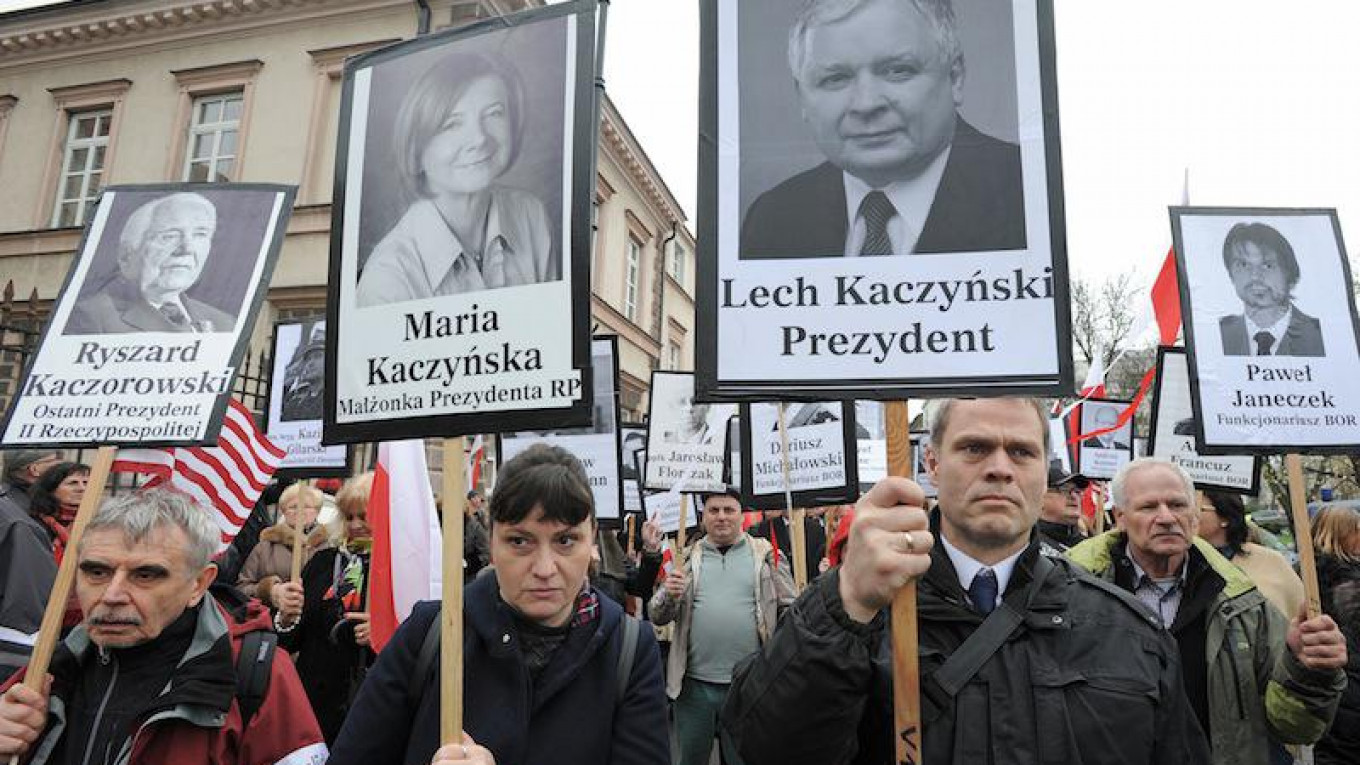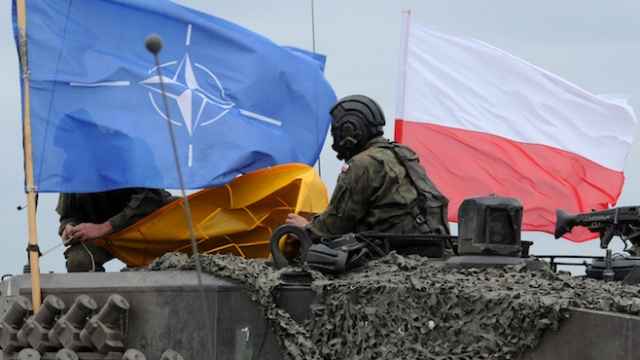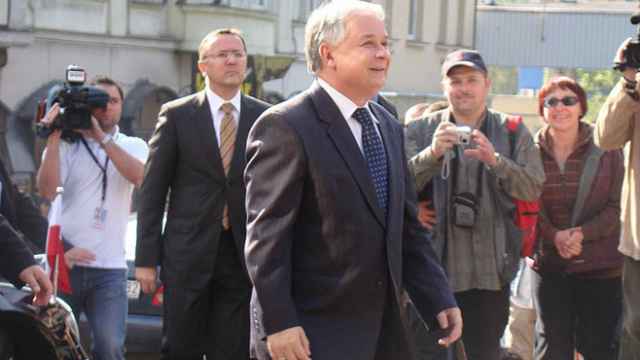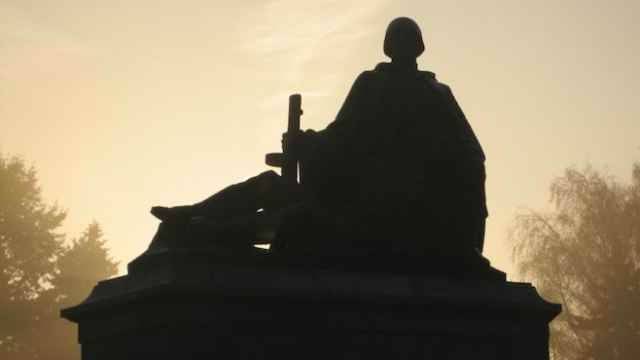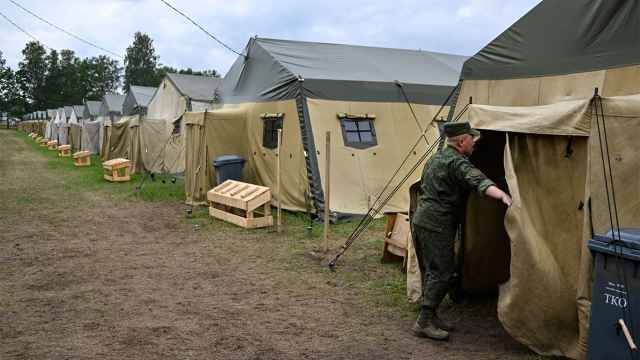Polish Defense Minister Antoni Macierewicz held a press conference on Thursday, Sept. 15, to discuss the findings of a commission he formed to reopen the investigation into the 2010 plane crash that killed President Lech Kaczyński and 95 others near a Russian military airport in Smolensk. Macierewicz, who blames Russian officials for the tragedy, is the government minister most closely associated with the Smolensk conspiracy theory that has divided Poland for six years.
Macierewicz rejects previous independent investigations, which
ruled that the crash was the result of pilot error in poor
visibility. Instead, he has long pointed the finger at the Kremlin
and at Poland’s former prime minister and the current president of
the European Council, Donald Tusk.
The new commission formed by Macierewicz says the recordings
recovered from the plane’s black boxes were manipulated before
being turned over to Warsaw. Kazimierz Nowaczyk, the commission’s
deputy head, says “three seconds were cut out from the Polish
recordings, and five seconds from the Russian one.” Earlier this
week, the commission's chief, Wacław Berczyński, said the Russian
control tower in Smolensk misled the Polish flight crew. “We don't
know if it was intentional, though,” he added.
On Wednesday, Russia's Foreign Ministry spokesperson Maria
Zakharova said that officials should release the data “immediately”
if Warsaw has any information about Moscow being involved in the
crash. “These are very serious matters,” she added.
In response, Macierewicz promised to deliver the commission’s
research just as soon as Moscow returns the wreckage of Kaczyński’s
plane, which is still in Russia. “I'm glad that the Russian side,
for the first time, has showed readiness and an interest in helping,”
he said.
Moscow has repeatedly refused to return the wreckage until Russian
investigators have concluded their own probe into the crash.
Earlier this week, President Andrzej Duda, Prime Minister Beata Szydło and the leader of Poland's ruling party Jarosław Kaczyński (the identical twin brother of the late president) attended the premiere of a new government-funded blockbuster film about the plane crash. The trailer shows an explosion on board the plane and follows a journalist seeking to uncover the truth about what really happened in Smolensk. “I invite every Pole who wants to know the truth to watch this film,” Kaczyński said after the screening.
A Conspiracy Theory Dividing a Nation
When the terrible news from Russia reached Poland early on the
morning of April 10, 2010, a shocked nation initially stood united in
grief. Warsaw witnessed some of the biggest crowds in its history, as
people marched in vigils for their late president.
But it didn’t take long for cracks to appear, and the crash
offered the perfect ingredients for a gripping conspiracy theory.
On the day of the tragedy, the Polish delegation was traveling to
mark the 70th anniversary of the 1940 massacre in Katyn, where Soviet
secret police slaughtered 20,000 Polish officers in a forest outside
Smolensk. The Kremlin blamed the Nazis for the atrocity until as
recently as 1994.
Kaczyński’s visit was supposed to be a significant step in
(historically difficult) Polish-Russian relations. Russian state
television covered the event extensively, and many Russians learned
about what happened in Katyn for the first time.
In the late 2000s, during Dmitry Medvedev’s presidency, there
was a brief warming of relations between Warsaw and Moscow. As part
of that thaw, the Kremlin opened some of its archives, and released
hitherto secret documents about the Katyn massacre. A few months
before the crash, speaking in Gdańsk at a memorial event marking the
70th anniversary of the start of World War II, then-Prime Minister
Vladimir Putin surprised many Poles when he spoke of the “immoral
character” of the Molotov-Ribbentrop Pact. “We need to remember
these mistakes and what our country has done,” Putin said, in a
speech unthinkable today.
Hopes for more historical reconciliation died with President Lech
Kaczyński and his crew in the forest outside Smolensk North Airport,
not far from Katyn — a place many Poles consider to be cursed. The
tragedy reopened deep historical wounds.
Initially, Poles stood united in grief. But a heated conspiracy
theory was born almost as soon as the terrible news from Russia
reached Poland.
Before long, the victims of the plane crash were being called the
“fallen,” and compared to those exterminated in Katyn in 1940.
The president and his crew, so goes the theory, were fatalities in
yet another crime that Poland's domestic and foreign enemies want to
conceal. “Before, we weren’t allowed to talk about Katyn, and now
we’re not allowed to talk about what happened in Smolensk,” says
an actress in the trailer for the new Smolensk film.
The conspiracy theory also accuses the West of complicity, arguing
that it has historically sided with Moscow. Lech Kaczyński,
according to this hypothesis, is a martyr: the only post-1989 Polish
leader who wanted a truly independent Poland, and for that he paid
the ultimate price.
Macierewicz, one of the Kaczyński brothers’ longtime allies,
was among the first to endorse the conspiracy theory publicly.
Shortly after the crash, he suggested openly that the Russians were
responsible for an onboard explosion that downed the plane. He has
dismissed every investigation into the crash, except his own, as
“biased.”
Few believed Macierewicz in 2010, but a relentless media campaign
by the Polish right-wing media has transformed the Smolensk
conspiracy theory into a powerful political tool. The conservative
wing of the powerful Polish Catholic Church was also quick to support
the theory.
A Theory Welcomed by Moscow
Six years after the crash, Kaczyński's nationalist Law and
Justice Party is back in power and many government ministers openly
support the idea that Moscow orchestrated Kaczyński’s death, or
they at least question the results of past investigations of the
crash.
Officials in Moscow, meanwhile, rarely react to the accusations.
Polish liberals accuse Law and Justice of playing into the Kremlin’s
hands: the Smolensk conspiracy theory makes Poland’s broader
security fears about Russian aggression seem like a farce.
The Polish opposition says reopening the probe into the plane
crash is more about purging the country’s previous centrist
officials than it is about accusing Moscow. On Thursday, Sept. 15,
opposition leader Ryszard Petru said the new commission is about
“revenge” on the former government. Former President Aleksander
Kwaśniewski also commented on Macierewicz’s press conference,
saying Russia had no reason to feel threatened by Lech Kaczyński.
A Message from The Moscow Times:
Dear readers,
We are facing unprecedented challenges. Russia's Prosecutor General's Office has designated The Moscow Times as an "undesirable" organization, criminalizing our work and putting our staff at risk of prosecution. This follows our earlier unjust labeling as a "foreign agent."
These actions are direct attempts to silence independent journalism in Russia. The authorities claim our work "discredits the decisions of the Russian leadership." We see things differently: we strive to provide accurate, unbiased reporting on Russia.
We, the journalists of The Moscow Times, refuse to be silenced. But to continue our work, we need your help.
Your support, no matter how small, makes a world of difference. If you can, please support us monthly starting from just $2. It's quick to set up, and every contribution makes a significant impact.
By supporting The Moscow Times, you're defending open, independent journalism in the face of repression. Thank you for standing with us.
Remind me later.


